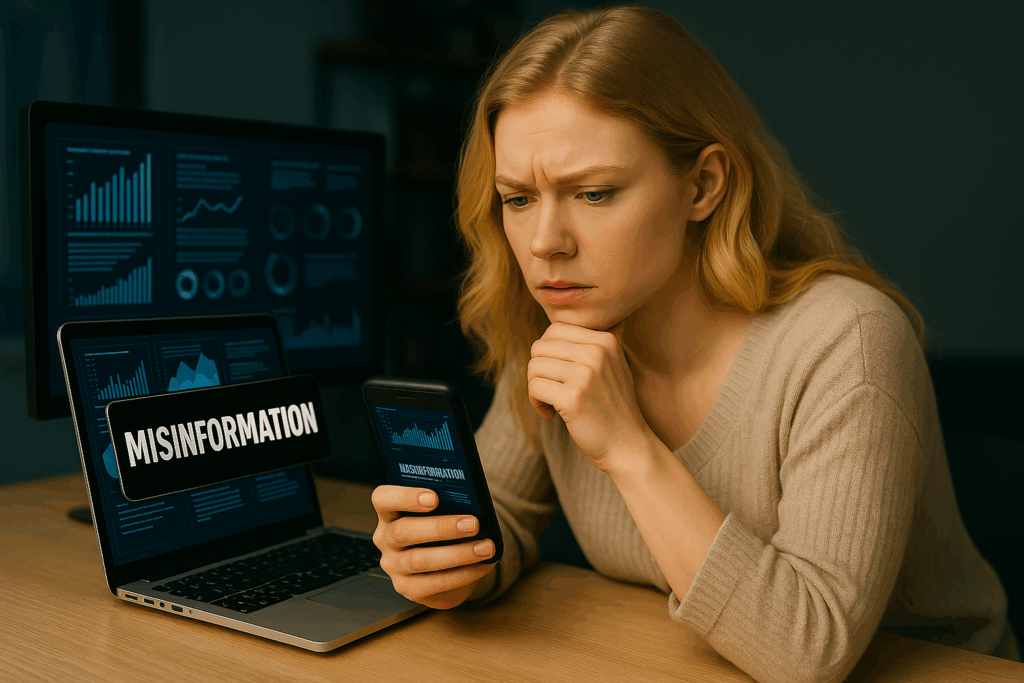
In today’s digital world, information spreads rapidly, often without verification. You’ve likely encountered a sensational headline or a viral post that turned out to be false. This phenomenon is known as misinformation. Understanding what misinformation is and how it differs from disinformation is crucial for navigating the vast sea of information online.This article delves into the meaning of misinformation, its implications, and strategies to combat it: BBC
What Does “Misinformation” Mean?
Misinformation refers to false or inaccurate information shared without the intent to deceive. It’s often the result of misunderstandings, misinterpretations, or errors in reporting. Unlike disinformation, which is deliberately spread to mislead, misinformation is typically shared by individuals who believe the information to be true. According to Merriam-Webster, misinformation is “incorrect or misleading information”
The Difference Between Misinformation and Disinformation
While both misinformation and disinformation involve the spread of false information, the key difference lies in intent.
-
Misinformation: False information shared without malicious intent.
-
Disinformation: False information deliberately created and disseminated to deceive or mislead.
For instance, sharing an outdated health guideline believing it’s still valid constitutes misinformation. Conversely, fabricating a news story to sway public opinion is disinformation
Common Examples of Misinformation
Misinformation can manifest in various forms across different platforms:
-
Health Myths: Claims like “drinking hot water cures COVID-19” circulated widely during the pandemic, despite lacking scientific backing .
-
Misattributed Quotes: Famous sayings wrongly attributed to notable figures, leading to widespread belief in false associations.
-
Edited Images: Photos altered to misrepresent events or situations, often shared without context.
-
Viral Memes: Humorous or satirical content taken out of context, leading to misunderstandings.
The Impact of Misinformation
The spread of misinformation can have significant consequences:
-
Public Health Risks: False health information can lead to harmful practices or vaccine hesitancy.
-
Social Unrest: Misinformation can fuel tensions, leading to protests or violence.
-
Erosion of Trust: Continuous exposure to false information can diminish trust in institutions and media.
-
Political Polarization: Misinformation can deepen divides by reinforcing existing biases.
A notable example is the spread of false information during the COVID-19 pandemic, which led to confusion and hindered public health efforts .
How to Identify and Prevent Misinformation
Combating misinformation requires vigilance and critical thinking:
-
Verify Sources: Always check the credibility of the source before accepting information as true.
-
Cross-Reference Information: Look for the same information across multiple reputable outlets.
-
Be Skeptical of Sensationalism: Headlines designed to provoke strong emotions may be misleading.
-
Educate Yourself: Stay informed about common misinformation tactics and how to spot them.
-
Report False Information: Use platform tools to flag and report misleading content: Wikipedia
Frequently Asked Questions (FAQ)
What is the meaning of misinformation?
Misinformation refers to false or inaccurate information shared without the intent to deceive.
How does misinformation differ from disinformation?
Misinformation is shared without malicious intent, while disinformation is deliberately created to mislead.
Can misinformation have serious consequences?
Yes, it can lead to public health crises, social unrest, and erosion of trust in institutions.
How can I protect myself from misinformation?
By verifying sources, cross-referencing information, and staying informed about common misinformation tactics.
Conclusion
In an era where information is abundant and rapidly disseminated, understanding the meaning and implications of misinformation is more important than ever. By staying vigilant, verifying sources, and promoting media literacy, we can collectively combat the spread of false information and foster a more informed society.


